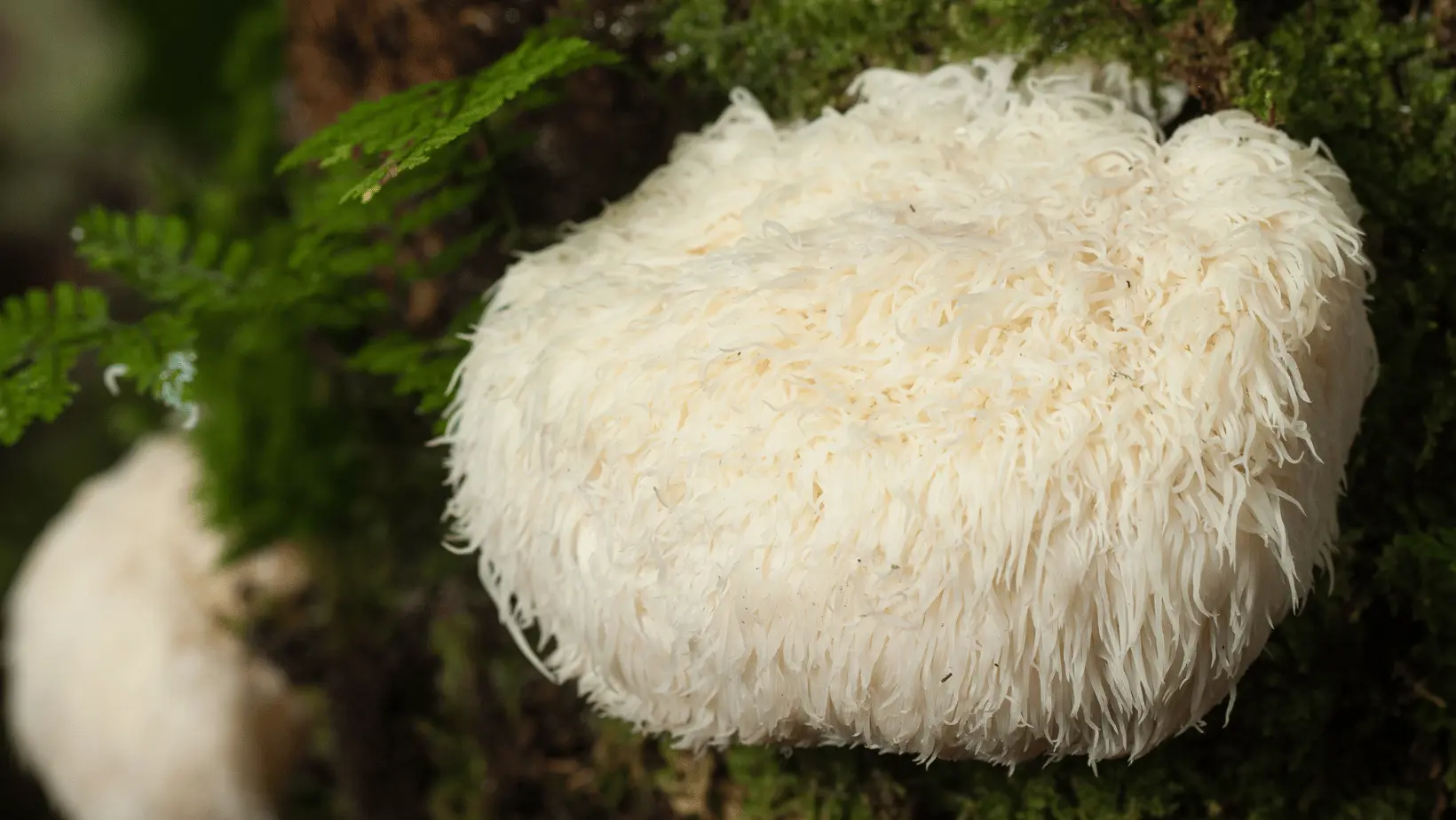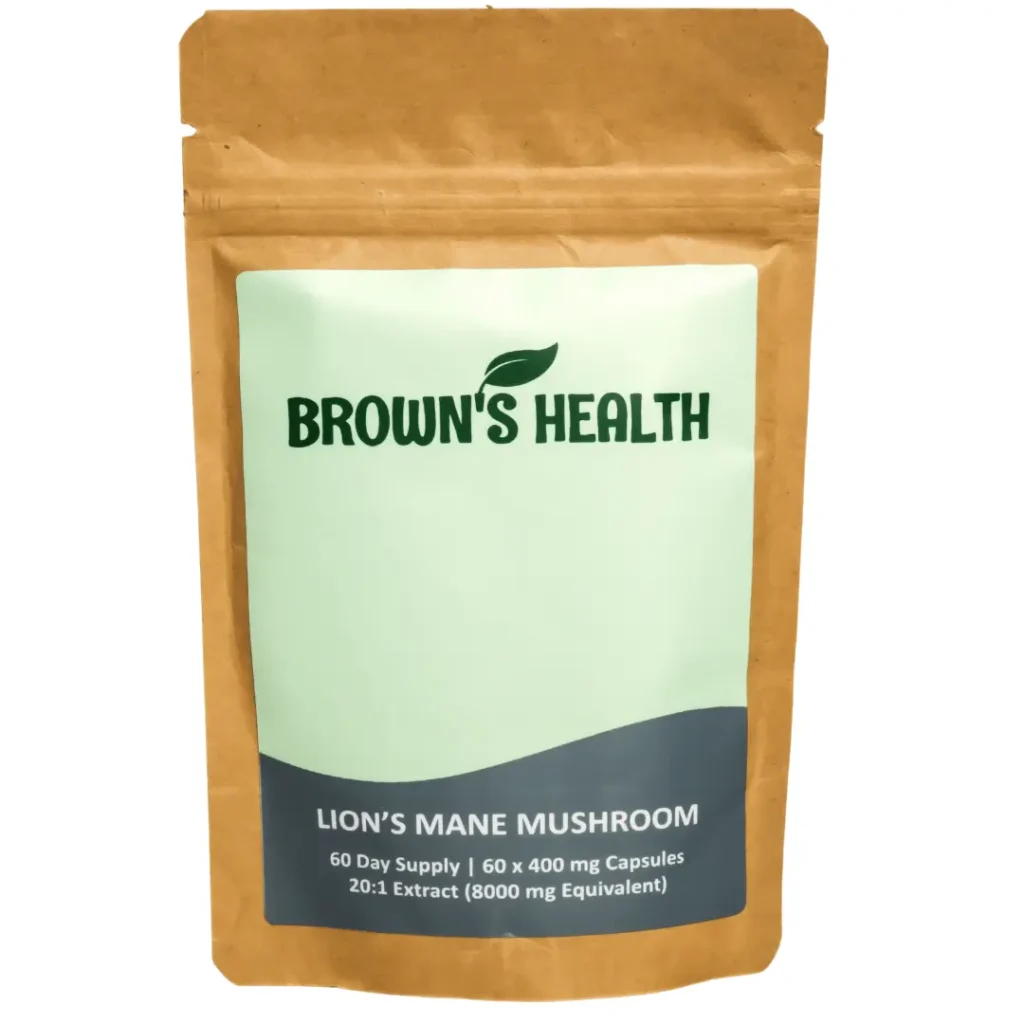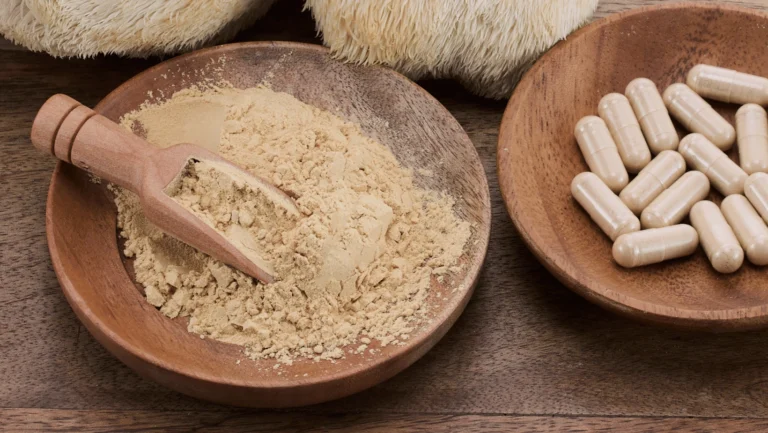
Have you ever heard of a mushroom that not only tastes delicious but may also offer a plethora of potential health benefits? Meet Lion’s Mane mushroom, a unique fungus with culinary and possible medicinal uses that has gained attention for its potential cognitive, immune, and mental health benefits. Intrigued? Let’s delve into the world of Lion’s Mane and discover the secrets of this fascinating mushroom.
Key Takeaways
- Lion’s Mane mushroom has a long history of traditional use in Asian and European medicine and cuisine, with potential health benefits including cognitive function enhancement, immune system support, and stress reduction.
- High-quality Lion’s Mane supplements are available to include in your daily routine. It is important to consult a healthcare provider before beginning supplementation for optimal safety.
- Fresh Lion’s Mane mushrooms can provide unique flavor to dishes as well as potential health benefits when added to one’s diet.
Understanding Lion’s Mane Mushroom
Lion’s Mane mushroom (Hericium erinaceus) is a versatile fungus with a long history of use in traditional Asian and European medicine and cuisine. It is known for its potential health benefits, such as improved cognitive function, immune system support, and stress reduction. The fruiting body and the root-like mycelium contains bioactive compounds that may provide these benefits.
Traditionally, lion’s mane mushrooms have been prepared by sautéing or stir-frying with ingredients such as butter, ghee, olive oil, shallots, ginger, and potatoes. But as well as being enjoyed for its unique taste, it was widely believed to have various health benefits and potential medicinal properties.
Culinary Uses
Lion’s Mane mushrooms offer a mild taste, making them a versatile ingredient that can be incorporated into a wide range of dishes. Some recipes featuring Lion’s Mane include:
- Lion’s Mane Mushroom Crab Cakes
- Spicy Cumin Lion’s Mane Mushrooms
- Pan-Fried Lion’s Mane Mushrooms with Garlic and Herbs
- Lion’s Mane Vegan Crab Cakes
They can also be used in savory dishes like stews or even sweet beverages like hot chocolate.
Notably, Lion’s Mane serves as a superb choice for vegan or vegetarian dishes, capable of creating scrumptious meat substitutes like:
- vegan crab cakes
- liver and onions
- steak substitutes
- nuggets
In addition to its culinary applications, Lion’s Mane is believed to aid immune function.
Traditional Medicine
Traditional medicine has long recognised the potential health benefits of Lion’s Mane mushrooms. In traditional Chinese medicine, it was typically used to:
- Bolster the stomach
- Reinforce the spleen
- Nourish the gut
- Sustain the five internal organs, especially the brain
- Improve cognitive function
In Japan, Lion’s Mane has been similarly utilised as a fortifying agent for the spleen and nourishing the gut.
Lion’s Mane mushrooms can be prepared for use in various ways, such as:
- Incorporating them into soups
- Brewing them into teas
- Taking them in tincture form
- Consuming them via capsules
In Ayurvedic medicine, they were prepared as a ‘ghrita’ or herbal ghee by slowly cooking them with ghee (clarified butter) to extract their beneficial properties using only natural methods.
Many companies use a dual extraction method to get the most out of this mushroom. This is because it contains both water-soluble and ethanol-soluble compounds. Hence, a dual extraction of bot water and ethanol is often performed to retain the full range of beneficial compounds.
Health Benefits of Lion’s Mane Mushroom
Although research is still ongoing, Lion’s Mane mushrooms have been suggested to provide a range of health benefits, including improved cognitive function, immune system support, and stress reduction. Some people also consume Lion’s Mane to reduce mild symptoms of various health issues.
Let’s explore these potential benefits in more detail as we develop practical health applications and discover more practical health applications.
Cognitive Enhancement
Numerous studies have delved into the potential cognitive enhancement effects of Lion’s Mane mushroom. These studies have shown promising results, indicating that Lion’s Mane may potentially be beneficial in enhancing cognitive function, memory, and brain cell growth. Some studies have even suggested that Lion’s Mane could be effective in alleviating symptoms of mild cognitive impairment.
While these findings are certainly promising, they underscore the need for further research to confirm Lion’s Mane’s effectiveness in cognitive enhancement and its potential to alleviate brain fog. Despite this, the mushroom exhibits immense potential as a cognitive booster.
Immune System Support
Boosting the immune system is another potential benefit of Lion’s Mane mushrooms. Research has shown that beta-glucans and other bioactive compounds in Lion’s Mane are beneficial for immune system support. These compounds may help improve cell-mediated and humoral immunity, stimulate macrophage phagocytosis, and augment the activity of the intestinal immune system.
Furthermore, Lion’s Mane mushrooms have been observed to possess anti-inflammatory and antioxidant properties, which may help reduce inflammation and oxidative stress, thus further contributing to immune function. Yet, a deeper investigation is required to substantiate these claims thoroughly.
Mental Health and Stress Reduction
Lion’s Mane mushrooms may also play a role in reducing stress and anxiety, as well as providing potential alternative treatment options for depression. Studies suggest that Lion’s Mane may have a positive effect on depression due to its ability to increase nerve growth factor, which can support the health of nerve cells, both of which are important for regulating mood.
Moreover, compounds such as hericenones and erinacines in Lion’s Mane mushrooms are believed to contribute to brain health by:
- Stimulating the growth of brain cells
- Improving brain function
- Reducing markers of inflammation
- Increasing levels of a nerve growth factor in the brain
- Acting as an adaptogen to help the body respond to stress and anxiety
Lion’s Mane may even have a positive effect on mild symptoms of anxiety and depression.
Potential Side Effects and Precautions
Despite the myriad of potential health benefits Lion’s Mane mushrooms present, one should also be mindful of potential side effects and precautions. These could encompass allergic reactions, gastrointestinal discomfort, and the necessity for consultation with a healthcare provider prior to use.
Allergic Reactions
In extremely rare cases, allergic reactions to Lion’s Mane may occur, particularly in individuals with asthma or allergies. Some reported allergic reactions to this mushroom include:
- Hives
- Swelling
- Difficulty breathing
- Abdominal pain
Although these reactions are generally uncommon, it’s crucial to be cautious when consuming Lion’s Mane, especially if you have a history of allergies to other fungi, mold, or yeast.
In case of an allergic reaction, it is imperative to seek medical assistance as soon as possible. Treatment may involve the use of oral or nasal antihistamines to reduce symptoms, such as swelling, difficulty breathing, skin rashes, and runny nose.
Gastrointestinal Issues
Though Lion’s Mane mushrooms have been found to potentially help with gastrointestinal issues such as gastritis and inflammatory bowel disease, some individuals may experience mild gastrointestinal side effects, such as abdominal discomfort. These effects may be reduced by taking the mushroom with food.
The frequency of gastrointestinal issues in individuals consuming Lion’s Mane varies depending on the individual and other factors, such as personal preferences, dosage, and individual health conditions. It is advisable to consider these factors and consult with a healthcare provider prior to using Lion’s Mane mushroom supplements.
Consultation with Healthcare Provider
As is the case with any supplement or dietary modification, prior consultation with a healthcare provider is paramount before incorporating Lion’s Mane into your daily routine. This is especially crucial for individuals with pre-existing conditions or those on medications like antiplatelet drugs that could interact with Lion’s Mane.
A healthcare provider can provide tailored advice on the appropriate dosage of Lion’s Mane, as well as monitor any potential side effects or interactions with other medications. Remember, it’s always better to be safe than sorry when it comes to your health.
Lion’s Mane Supplements and Extracts

Lion’s Mane supplements and lion’s mane mushroom extract are conveniently accessible, simplifying the process of incorporating this intriguing mushroom into your daily routine. However, selecting high-quality products and adhering to dosage guidelines is essential to maximise the benefits of your Lion’s Mane consumption.
Choosing Quality Products
When purchasing Lion’s Mane capsules, it’s important to look for professional-grade manufacturers that conduct third-party testing to ensure the quality and purity of their products. Avoid products containing mycelium, as these may have reduced potency and effectiveness compared to those made from the actual fruiting body of the mushroom.
Additionally, consider choosing products made without unnecessary additives or other potentially harmful chemicals. By selecting high-quality Lion’s Mane products, you can feel confident in the safety and effectiveness of your supplements.
Dosage Recommendations
Dosage recommendations for Lion’s Mane can vary depending on factors such as age, health conditions, and the form of supplementation. At BROWN’S HEALTH, we recommend 1-2 of our high-strength capsules per day.
Before beginning supplementation, a consultation with a healthcare provider may be useful as they can provide personalised advice on the suitable dosage for your individual needs and oversee any potential side effects or interactions with other medications.
Incorporating Lion’s Mane into Your Diet
There are numerous ways to include Lion’s Mane in your diet, either by preparing meals with fresh mushrooms or supplementing with extracts. Regardless of the method you opt for, you can expect to start reaping the potential health benefits of this distinctive mushroom.
Cooking with Fresh Lion’s Mane
Fresh Lion’s Mane mushrooms can be a delicious addition to your meals, offering a unique and mild flavor that works well in a variety of dishes. They can be prepared in the following ways:
- Sautéed
- Stir-fried
- Grilled
- Added to soups and stews
When preparing fresh Lion’s Mane, be sure to clean and trim the mushrooms properly to ensure optimal taste and texture.
In addition to their culinary uses, fresh Lion’s Mane mushrooms are also a great source of vitamins and minerals, making them a nutritious choice for your diet. So why not give this unique mushroom a try and see how it can enhance your culinary creations?
Supplementing with Lion’s Mane
For those who prefer a more convenient approach to incorporating Lion’s Mane into their routine, supplementation is an ideal option. Lion’s Mane supplements come in various forms, such as lion’s mane capsules, powders, and tinctures, making it easy to find the right product for your needs.
However, remember to:
- Choose quality products
- Follow dosage guidelines, as mentioned earlier
- Consult with a healthcare provider before starting supplementation to ensure you’re taking the right dosage and avoiding potential side effects or interactions with other medications.
Summary
In conclusion, Lion’s Mane mushroom is a unique and fascinating fungus that offers a range of potential health benefits, from cognitive enhancement and immune system support to stress reduction and mental health improvement. Whether you choose to cook with fresh Lion’s Mane mushrooms or supplement with extracts, it’s essential to choose quality products and follow dosage recommendations to ensure optimal results. With its myriad of potential benefits, Lion’s Mane is certainly a mushroom worth exploring.
Other UK supplements that you may be interested in include:
- Ashwagandha KSM-66 Capsules
- Curcumin Capsules
- Tongkat Ali Capsules
- Magnesium Capsules
- Shilajit Capsules
Frequently Asked Questions
What are the benefits of taking Lion’s Mane?
Lion’s mane offers a range of potential benefits, such as protecting memory and fighting dementia, quelling depression symptoms, speeding up nerve cell recovery, reducing risk of stomach ulcers, reducing inflammation, and boosting the immune system. Most research is limited and conducted on animals.
Why is lions mane illegal in uk?
Harvesting lion’s mane from the wild is illegal in the UK due to its protection status, making it rarely available in supermarkets or farmer’s markets. However, it is not illegal to buy from companies that do not harvest lion’s mane from the wild in the UK.
What are lion’s mane side effects?
Lion’s mane supplements may rarely cause abdominal discomfort, nausea, skin rash, and interfere with medications like warfarin and diabetes treatments.
Who should not eat lions mane?
People with bleeding disorders and those taking blood thinning medication should avoid consuming Lion’s Mane mushroom supplements. Pregnant women should also avoid taking it as a supplement and should try Lion’s Mane as a food first.
What is lion’s mane extract good for?
Lion’s mane mushroom extract has been associated with many potential health benefits, including improved digestive and nerve function, protection against dementia, reduced anxiety and depression symptoms, and aid in repairing nerve damage. However further solid evidence is needed to prove this.



